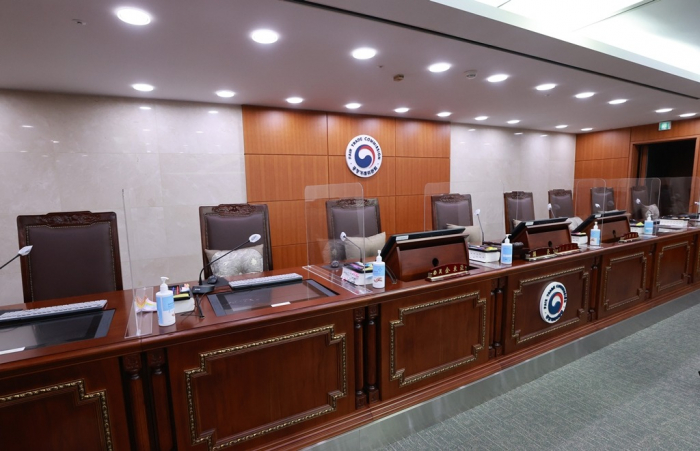Regulations
Samsung vetoes Broadcom's proposed measures to avoid Korean penalties
S.Korean tech firms such as Samsung call on FTC to seek ways to compensate for damages in the hundreds of millions of dollars
By May 04, 2023 (Gmt+09:00)
3
Min read
Most Read
LG Chem to sell water filter business to Glenwood PE for $692 million


Kyobo Life poised to buy Japan’s SBI Group-owned savings bank


KT&G eyes overseas M&A after rejecting activist fund's offer


StockX in merger talks with Naver’s online reseller Kream


Mirae Asset to be named Korea Post’s core real estate fund operator



Samsung Electronics Co. and other South Korean tech companies opposed measures proposed by Broadcom Inc. to avoid penalties by the country’s antitrust regulator, raising expectations of an international legal battle of hundreds of millions of dollars, local media reported.
Samsung, the world’s No. 2 smartphone maker, on Wednesday submitted to the Korea Fair Trade Commission (FTC) an official opinion containing concerns over Broadcom’s own corrective steps agreed upon with the watchdog, which has been investigating its unfair deals with local tech firms since 2021, The JoongAng Daily reported.
“Companies damaged by Broadcom turned in additional opinions,” the South Korean newspaper quoted an FTC official as saying on Thursday.
The US chipmaker allegedly compelled Samsung to ink a three-year deal for components of smart devices including parts for radio frequency (RF) front-end circuitry, Wi-Fi and Bluetooth.
The contract included provisions that Samsung had to purchase Broadcom’s parts worth $760 million from January 2021 until the end of 2023 while the world’s top memory chipmaker would make up any difference if it purchases less than that. The deal ended in August 2021 before its expiration.
The FTC had been expected to impose a similar penalty with South Korea’s largest-ever penalty of 1.03 trillion won ($800 million) imposed on Qualcomm Inc. But Broadcom applied for a consent order to the antitrust body to avoid such a punishment in July last year. A consent order is a way to wrap up an anti-competition case -- even before determining whether a company under an FTC investigation has breached the law -- if the firm voluntarily proposes appropriate corrective measures.
COMPENSATION FOR DAMAGES, NOT FUND
Broadcom promised to provide Samsung with three-year warranties and technical support for components equipped in products such as smart devices. It also vowed to establish a fund of 20 billion won to support small and medium-sized enterprises in the country’s semiconductor industry, while offering measures to cease putting undue pressure on Samsung and other local tech companies.
The FTC reached a preliminary agreement with Broadcom on the order with such pledges in January.
South Korean tech companies including Samsung, however, said those measures are not enough, given their damages in the hundreds of millions of dollars, requesting the FTC to include steps to compensate for the losses in the consent order, according to JoongAng.
Samsung asked the FTC to include compensation plans for damages to the company in the consent order or launch a formal review to check Broadcom’s illegality instead of the order, Yonhap News Agency reported.
POTENTIAL LEGAL BATTLE
The FTC, however, said it is difficult to reflect such requests as the process of the consent order is almost concluded, according to JoongAng. The regulator also completed collecting opinions from stakeholders and related government bodies such as the Ministry of Trade, Industry and Energy.
The antitrust watchdog is scheduled to hold a plenary session to finalize the consent order on June 7, Yonhap reported.
If the FTC does not incorporate requests by Samsung and other local companies in the consent order, it could result in an international legal battle, JoongAng expected.
“Damaged companies may file lawsuits based on the consent order,” the FTC official was quoted as saying.
Officials of Samsung, Broadcom and the FTC were not available for comment.
Write to Sul-Gi Lee at surugi@hankyung.com
Jongwoo Cheon edited this article.
More to Read
-
 Tech, Media & TelecomS.Korean supreme court upholds $800 mn fine against Qualcomm
Tech, Media & TelecomS.Korean supreme court upholds $800 mn fine against QualcommApr 13, 2023 (Gmt+09:00)
3 Min read -
 RegulationsBroadcom to give Samsung warranties to avoid Korea penalties
RegulationsBroadcom to give Samsung warranties to avoid Korea penaltiesJan 09, 2023 (Gmt+09:00)
2 Min read -
 RegulationsBroadcom not to force S.Korean tech companies on deals
RegulationsBroadcom not to force S.Korean tech companies on dealsSep 08, 2022 (Gmt+09:00)
2 Min read -
 RegulationsBroadcom applies for consent order on unfair deals with Samsung
RegulationsBroadcom applies for consent order on unfair deals with SamsungAug 05, 2022 (Gmt+09:00)
2 Min read
Comment 0
LOG IN


